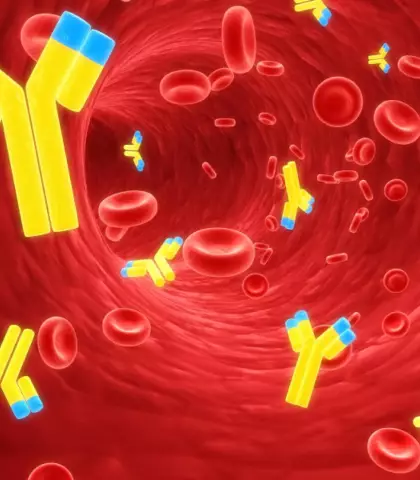- Author Rachel Wainwright wainwright@abchealthonline.com.
- Public 2023-12-15 07:39.
- Last modified 2025-11-02 20:14.
Antibodies in pregnancy

One of the important indicators during pregnancy is the result of a blood test for Rh belonging. When a negative Rh factor is detected, laboratory technicians continue the study and detect the presence of antibodies during pregnancy, as their presence indicates possible complications. The essence of the conflict in the "mother-fetus" system is that the embryo for a pregnant woman is half a foreign body. The “graft” rejection reaction proceeds in different ways:
- Early toxicosis;
- Gestosis in the second half of pregnancy;
- Conflict over group or Rh blood belonging.
The most dangerous reaction occurs at the level of blood cells - erythrocytes. All organs of the body receive nutrition thanks to red blood cells, when they are destroyed, a state of oxygen starvation sets in, which leads to irreversible consequences. That is why it is so important to test for the presence of antibodies during pregnancy if the expectant mother has Rh-negative blood.
Antibodies in the blood during pregnancy
Antibodies are immune cells that are responsible for recognizing and destroying foreign elements. They can be bacteria, viruses, toxic substances, as well as cells of your own body or fetus.
The Rh factor of blood is an individual marker. It is either present in the membranes of red blood cells, or it is not. Therefore, the blood of the tested people can be Rh-positive or Rh-negative. There are laboratory cases when in the same woman Rh is positive, and in subsequent analyzes, it is not found. The result of the analysis for antibodies in the blood during pregnancy with a positive Rh factor becomes unclear. But everything is explained from a genetic point of view.
The mechanism of formation of the Rh factor
The Rh factor of blood is inherited by two pairs of alleles. Genes labeled D and d stand for dominant and recessive inheritance. When the fetus is dominated by dominant alleles (DD), the blood test for Rh is positive. If recessive (dd), respectively - negative. Any other combination of genes: dD or Dd, is manifested by a positive reaction. If the dominant alleles are less than 25%, then rhesus appears in the analyzes, it is not detected (“disappears”). Therefore, antibodies during pregnancy can appear even with a "negative" (dD) or "weak" (Dd) Rh factor of the blood.
The mechanism of inheritance also explains why Rh-positive children can be born from Rhesus-free parents. When genes are “mixed”, pairs are formed in it, carrying the dominant gene. That's all.
The effect of antibodies during pregnancy on the fetus and newborn
Rh-conflict occurs only when the child has a Rh marker, and it is completely absent in the mother's blood. When the fetus is in the womb, there is an active gas exchange between the erythrocytes of the mother and the embryo. When both red blood cells are equally charged, nothing happens. But the "plus" is attracted to the "minus" and both cells stick together. To prevent agglutination, antibodies appear in the mother's blood during pregnancy, which are deposited in the red blood cells of the fetus. As a result, the mother's blood remains intact, but immune cells accumulate on the baby's erythrocytes, which gradually destroy the protein component of hemoglobin.
In early pregnancy, this can lead to miscarriage. In the late - the development of hemolytic jaundice with damage to the hematopoietic organs and the brain of the child.
Antibody titer during pregnancy
The titer is the number of certain indicators in the analyzes. When a woman develops pregnancy, provided that the fetus has a positive blood Rh, antibodies of the "M" class are formed. Their molecular weight is so high that cells do not penetrate the vascular wall of the chorion and the placental barrier. But, when the pregnancy is repeated, there are antibodies in the mother's blood (they are formed immediately and remain for the rest of her life), only now cells of "quick response" are produced - immunoglobulins of class G. They freely pass through natural filters and can cause both a rejection reaction and and hemolytic disease of the fetus or newborn. When registering, the antibody titer during pregnancy is determined, which should be checked over time. Blood tests are carried out periodically,during which the rise in antibody titer is determined. Either it remains unchanged or it rises. At the same time, figures are important, but the rate of increase in quantity. With an accelerated titer increase, the necessary measures are taken. Typically, treatment is limited to therapeutic methods.

Currently, the monitoring of the amount of antibodies during pregnancy is performed regularly, which allows you to choose the right tactics for childbirth. They are produced according to the planned plan, that is, either conservatively or promptly. This does not depend on the amount of antibodies during pregnancy, but it affects additional measures for the prevention of hemolytic disease of the newborn. In special cases, the child undergoes a blood transfusion, and everything must be prepared for this manipulation in advance.
What should be the norm of antibodies during pregnancy?
Tests for antibodies during pregnancy are taken regularly in cases where the expectant mother is diagnosed with Rh-negative blood. As a rule, the results of blood tests do not cause any concern. Doctors do not report anything about the growth of antibodies, because it is not observed. Perhaps that is why it is believed that antibodies during pregnancy have some norm. In fact, their presence does not indicate either the norm or the pathology. If there is a sharp increase in the numbers of immunoglobulins G, the woman is offered to give birth in the perinatal center or in the regional maternity ward with an intensive care unit for newborns.
Found a mistake in the text? Select it and press Ctrl + Enter.






